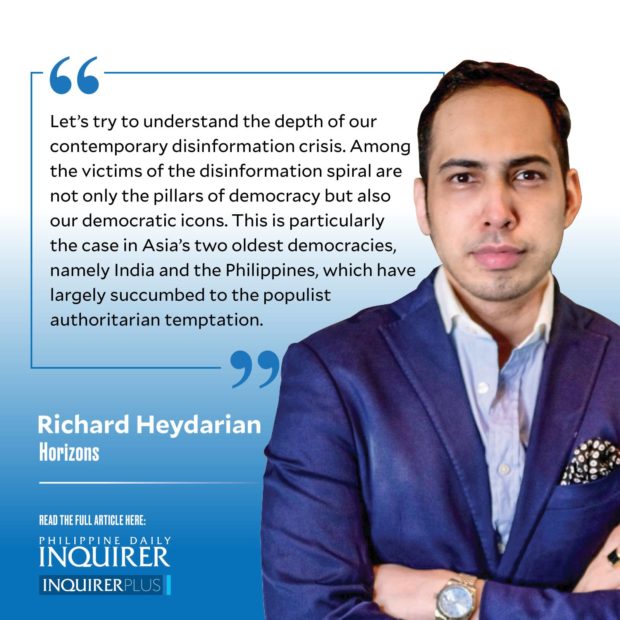Gandhi, Ninoy, and the disinformation crisis
 The ultimate buzzword nowadays, especially among defenders of democracy, is “disinformation”: namely, the deliberate and systematic distortion of public opinion to serve, in most cases, authoritarian-populist ends. The situation has become so dire and desperate that some observers have warned of the arrival of the age of “post-truth politics,” whereby the toxic cocktail of affective political manipulation and corporate microtargeting is undermining the very foundations of any “reality-based community,” thus making facts-driven, rational public discourse close to impossible.
The ultimate buzzword nowadays, especially among defenders of democracy, is “disinformation”: namely, the deliberate and systematic distortion of public opinion to serve, in most cases, authoritarian-populist ends. The situation has become so dire and desperate that some observers have warned of the arrival of the age of “post-truth politics,” whereby the toxic cocktail of affective political manipulation and corporate microtargeting is undermining the very foundations of any “reality-based community,” thus making facts-driven, rational public discourse close to impossible.
Notwithstanding its merits, what the disinformation-centric discourse often misses, however, is a more fundamental understanding of contemporary human condition. In economics parlance, what we also need is a “demand-side” understanding of the disinformation crisis. Why are so many folks susceptible to networks of disinformation? Why is “fake news” so popular? Why are so many supposedly “highly educated” voters easily enamored with populist charlatans?
Let’s first, dear reader, try to understand the depth of our contemporary disinformation crisis. Among the victims of the disinformation spiral are not only the pillars of democracy but also our democratic icons. This is particularly the case in Asia’s two oldest democracies, namely India and the Philippines, which have largely succumbed to the populist authoritarian temptation.
Article continues after this advertisementThough hailed as the “father of the nation,” Mahatma Gandhi’s legacy is under siege. As historian Ramachandra Guha, the foremost biographer of the Indian democratic icon, explained in a passionate essay, “the public mood [in the country] has turned hostile to Gandhi.” In the past, conspiratorially minded Marxist intellectuals accused Gandhi of being “an agent simultaneously of the British colonial state and of the Indian capitalist class,” whose nonviolent struggle was supposedly “a cunning device to wean the masses away from the revolutionary path.” The Naxalites, a Maoist insurgent group in West Bengal, never shied away from vandalizing Gandhi’s statues.
As Guha notes, however, India’s democratic icon is now facing systematic assault by more mainstream populist elements, who have gone so far as “hail[ing] Gandhi’s assassin [Nathuram] Godse as a true “deshbhakt” (patriot)” with “praise for him trend[ing] on Twitter every Jan. 30” and even “periodic plans to erect statues to him and temples in his memory.” Online videos “mocking Gandhi and charging him with betraying Hindus” have gone viral.
For Guha, what is taking place in his home country is nothing less than “parricide,” namely “the outright repudiation of the person who perhaps did more than anyone else to nurture this nation into being.” Sounds eerily familiar? After all, a similar phenomenon can be observed in the Philippines, where another democratic icon, Benigno “Ninoy” Aquino Jr., is experiencing a similar ordeal.
Article continues after this advertisementThe rise of authoritarian populism in the past decade has coincided with a vicious disinformation campaign against our country’s democratic icon. Social media platforms in the Philippines have become a cesspool of conspiracy theories seeking to portray Ninoy as invariably an opportunist, a communist, and a traitor.
As Vincent Tañada, who has just released his latest movie, “Ako Si Ninoy,” recently told me: merchants of disinformation have deliberately focused on Ninoy’s more “traditional politician” background in younger years in order to undermine his genuine struggle for democratic revolution in more mature years.
The popularity of disinformation-infested propaganda, however, has deep roots. In many ways, it can be traced back to the more “illiberal” tendencies in our political culture, dating back to both precolonial as well as Western imperialism periods, but also to abject failures of self-styled liberal regimes in recent memory. In India, Guha notes, the “decertification of Gandhi has been aided by the hypocrisy and misconduct of the Congress party,” the main liberal party, which dominated Indian politics throughout decades, even as their “politicians ostentatiously wore homespun cotton while promoting cronyism and corruption.”
Similarly, Ninoy is being (unfairly) blamed for all the shortcomings of countless self-described liberal politicians who perpetuated a culture of incompetence and corruption while singing praises for the Aquino family. Thus, to fight disinformation, and to honor Ninoy’s legacy, is to, first and foremost, discard the very elements that undermined the Filipino people’s faith in liberal democracy.
The best way to fight disinformation is to acknowledge widespread disenchantment with deracinated liberal elites and reverse decades-long political adulteration of Ninoy’s ideological legacy. Beyond toxic self-righteousness and election result denialism, what we need is a genuinely progressive movement for democratic transformation.
rheydarian@inquirer.com.ph
















